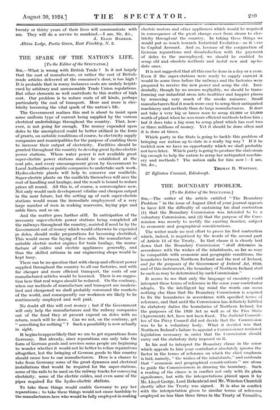THE SPARK OF THE NATION'S LIFE.
[To the Editor of the SPECTATOR.]
Sia,—What is wrong with British Trade ? Is it not largely that the cost of manufacture, or rather the cost of British- made articles delivered at the consumer's door, is too high ?
It is probable that in many instances costs are unduly height- ened by arbitrary and unreasonable Trade Union regulations.
But other elements as well contribute to this matter of high cost. Our problem is to reduce costs of all kinds, perhaps particularly the cost of transport. More and more is elec- tricity becoming the vital spark of the nation's life.
The Government realizes this and is about to insist upon some uniform type of current being supplied by the various electrical undertakings throughout the country. That, how- ever, is not going far enough. The money expended upon doles to the unemployed could be better utilized in the form of grants, on suitable conditions of course, to electricity supply companies and municipalities for the purpose of enabling them to increase their output of electricity. Facilities should be granted throughout the country to develop great hydro-electric power stations. Where water power is not available great super-electric power stations should be established at the coal pits, and every encouragement given by Government to Local Authorities or public companies to undertake such work. Hydro-electric plants will help to conserve our coalfields.
Super-electric plants on the coalfields themselves will save the cost of handling and haulage, and the result is bound to reduce prices all round. All this is, of course, a commonplace now.
Not only would such development vitalize and cheapen output in the near future, but the setting up of such super-electric stations would mean the immediate employment of a very large number of men in making reservoirs, laying pipe and cable lines, and so on.
And the matter goes further still. In anticipation of the necessary super-electric power stations being completed all the railways throughout the country, assisted if need be by the Government out of money which would otherwise be expended in doles, should make preparations for becoming electrified.
This would mean the laying of live rails, the manufacture of suitable electric motor engines for train haulage, the manu- facture of cables and electric appliances generally, and thus the skilled artisans in our engineering shops would be kept busy.
There can be no question that with cheap and efficient power supplied throughout the country to all our factories, and with far cheaper and more efficient transport, the costs of our manufactured articles would be lessened. There is no sugges- tion here that real wages should be reduced. On the contrary, when our methods of manufacture and transport are modern- ized and cheapened we shall probably command the markets of the world, and consequently our workmen are likely to be continuously employed and well paid.
No doubt all this will cost money ; but if the Government will only help the manufacturers and the railway companies out of the fund they at present expend on doles with no return, much will be done. Can we not, on the contrary, get "something for nothing " 2 Such a possibility is now actually in sight.
It begins to appear likely that we are to get reparations from Germany. But already, since reparations can only take the form of German goods and services some people are beginning to wonder whether it would not be better to refuse reparations altogether, lest the bringing of German goods to this country should cause loss to our manufacturers. Here is a chance to take from Germany some of the great dynamos and electrical installations that would be required for the super-stations, some of the rails to be used on the railway tracks for conveying electricity, some of the electric cables, and even some of the pipes required .for the hydro-electrie stations.
To take these things would enable Germany to pay her reparations ; to take these things would not cause hardship to the manufacturers here who would be fully employed in making electric motors and other appliances which would be required in consequence of the great change over from steam to elec- tricity throughout the country. In taking these things we would put so much towards Industrial Evolution—as it ;ere to Capital Account. And so, because of the conjunction of German reparations and dissatisfaction with the payment of doles to the unemployed, we should be enabled to scrap old and obsolete methods and instal new and up-to- date ones.
It is not suggested that all this can be done in a day or a year. Even if the super-stations were ready to supply current it would be some time before the railways and the factories were prepared to receive the new power and scrap the old. Inci- dentally, though by no means negligibly, we should be trans- forming our industrial areas into healthier and happier places by removing very much of the smoke nuisance. Small manufacturers find it much more easy to scrap their antiquated machinery and methods than do large manufacturers. It does not take a very big or brave man to scrap £2,000 or 13,000 worth of plant when he sees more efficient methods before him ; but it does take a big man to scrap plant which has cost two or three millions of money. Yet it should be done often and it is done at times.
Which party in the State is going to tackle this problem of bringing our nation up to date in a really big way ? If it be tackled now we have an opportunity which we shall probably not have later. Which party is going to produce the statesman big enough to help the nation to scrap her antiquated machin- ery and methods ? The nation calls for him now !—I am, Sir, &c.,


































 Previous page
Previous page